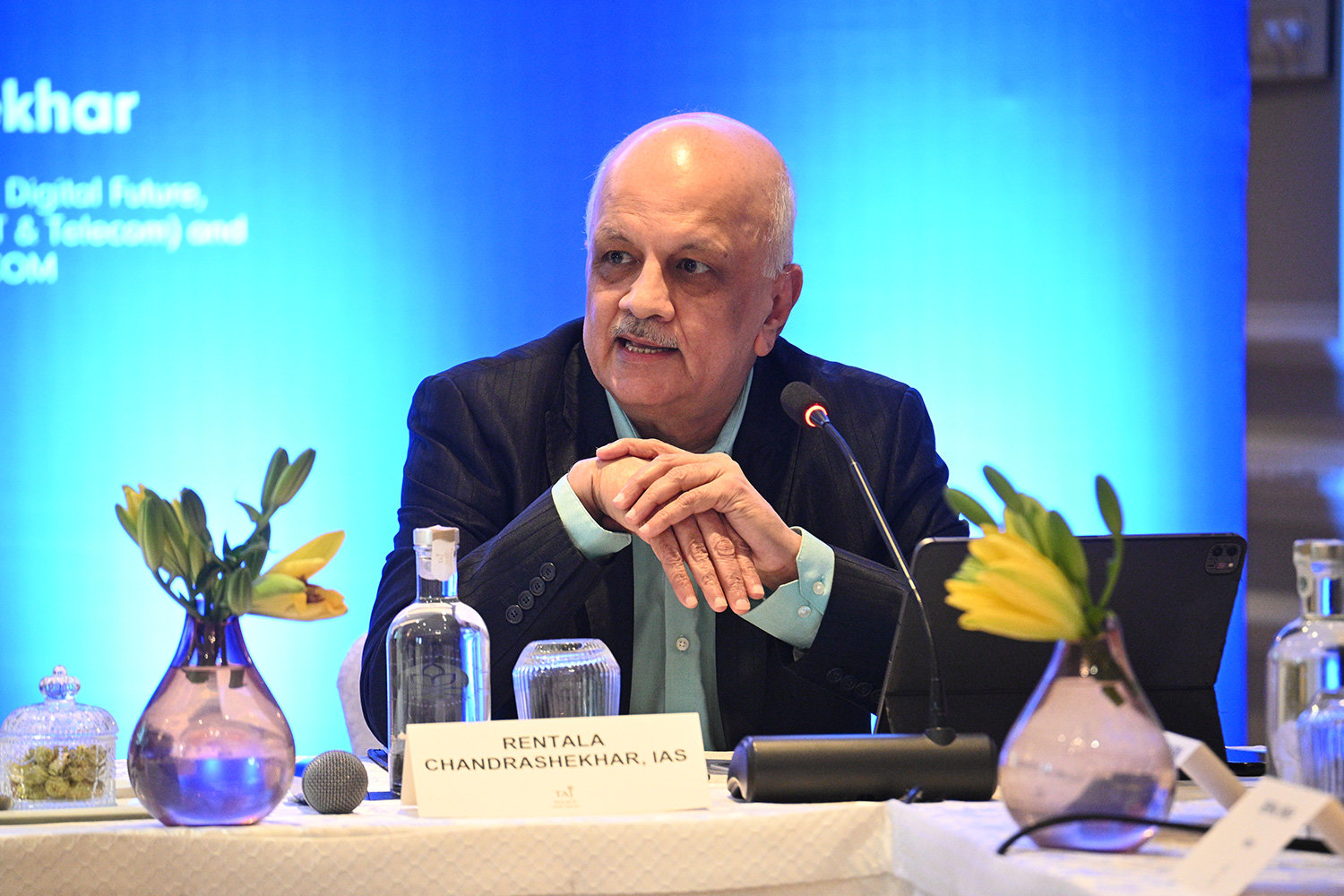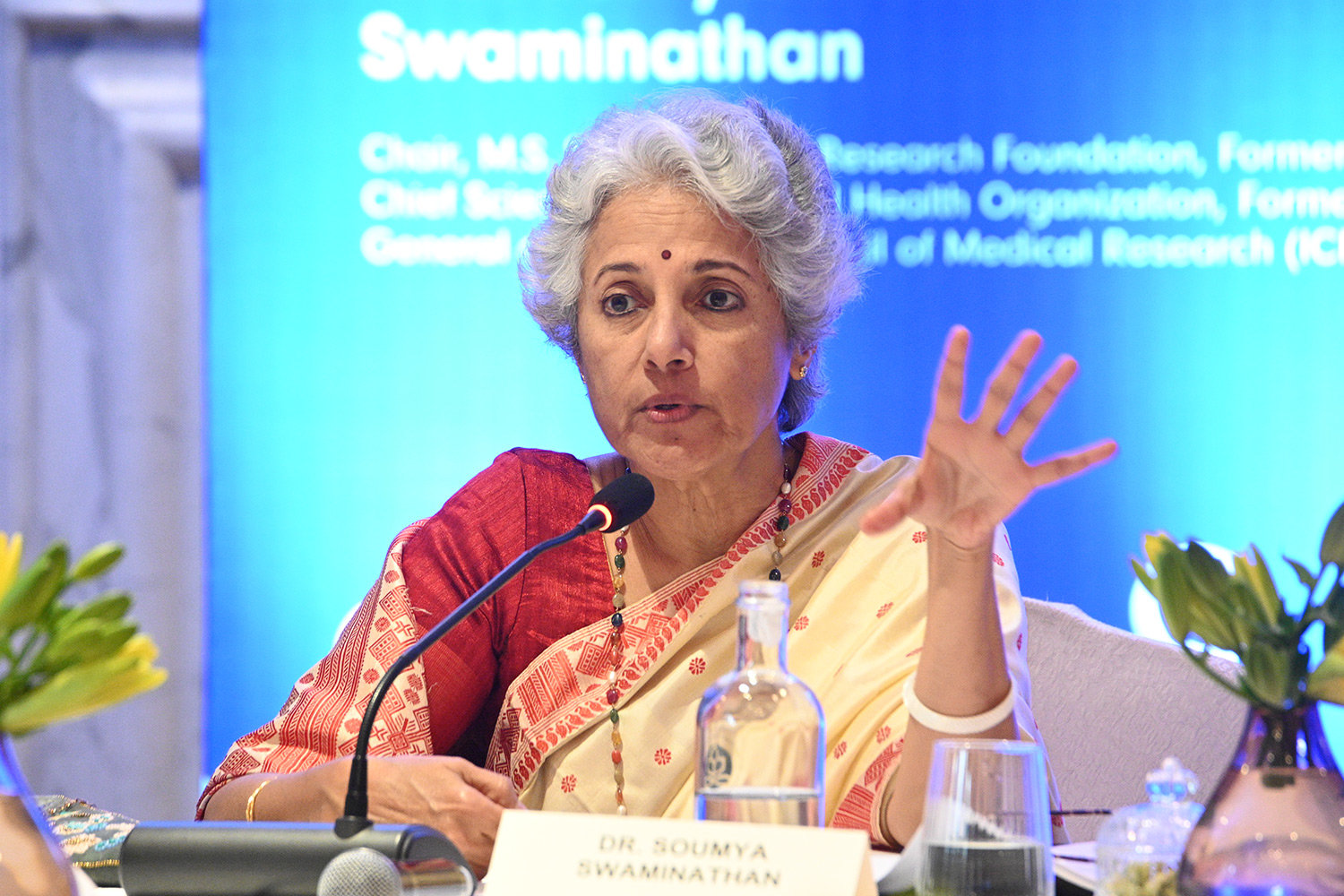21 Nov 2025
AI as a Catalyst for Healthcare Jobs and Opportunities in India
Technology is transforming India's healthcare ecosystem, bringing opportunities and challenges alike. In a nation as diverse and populous as India, healthtech is carving pathways for accessible, innovative, and data-driven solutions that hold the promise of equitable healthcare.
This month, Prosus - in collaboration with Ministry of Electronics and Information Technology (MeitY), Government of India - unpacked these themes at our Amrit Arogya: AI for Health, Healing, and New Horizons in Care roundtable, looking through the lens of AI’s transformative potential in India’s healthcare landscape, with an emphasis on creating jobs and fostering inclusivity. Bringing together esteemed leaders in healthcare, technology, and governance, the roundtable was co-chaired by Dr. Soumya Swaminathan: Chair, M.S. Swaminathan Research Foundation; Former, and first Chief Scientist of the World Health Organisation; and by Mr. Rentala Chandrashekhar: Chairman, Centre for the Digital Future; Former Secretary, GOI (IT & Telecom); and Former President, NASSCOM.
The Amrit Arogya (Healthcare) discussion is part of an AI roundtable series we’re running with MeitY AI for All: Catalysing Jobs, Growth, and Opportunity as a major pre-summit track for the India AI Impact Summit 2026 taking place in Delhi in February.
The Indian healthtech market is poised to hit US$50 billion by 2033, anchored by the rapid integration of AI, IoT, and robust digital platforms. The post-pandemic era has seen an exponential adoption of telemedicine, supported by over 750 million internet users. However, the country's healthtech revolution is defined by more than just market dynamics—it’s marked by the innovation of AI-enabled tools and a relentless pursuit to democratise healthcare access in Tier 2 and Tier 3 cities, where health inequities are acute. “AI’s real promise lies not just in diagnostics or automation, but in democratizing access to quality healthcare while creating millions of new jobs. The goal is to reimagine India’s healthcare ecosystem - enhancing outcomes, not replacing people,” said co-chair Mr. Rentala Chandrashekhar.

One of the pivotal discourses from the "Amrit Arogya" event revolved around the role of AI as an enabler rather than a disruptor, particularly when it comes to job creation. Contrary to fears of job displacement, the discussion highlighted that AI is creating unprecedented employment avenues. AI-based diagnostics, telemedicine platforms, digital trainers, and integration specialists are fostering job growth in healthtech, particularly in non-metro regions. Tools that automate diagnostic tasks (e.g., radiology or pathology) empower healthcare practitioners by reducing workloads and enabling rapid and accurate decision-making, but they also provide an opportunity for up-skilling semi-urban professionals on advanced digital tools, fostering greater inclusivity in local ecosystems. Companies like SigTuple, who use AI-powered robotic microscopes to aid diagnosis and screening through visual analysis of medical data, train technicians in smaller towns to use their advanced tools, which not only creates jobs in semi-urban and rural healthcare systems but also connects them to urban healthcare networks.
“Healthcare in India doesn’t need fewer people; it needs empowered people. AI can free our doctors from repetitive tasks, enable real-time multilingual support for patients, and help scale affordable care to every corner of the country,” said Mr. Abhishek Singh, CEO of the India AI Mission. This was seconded by Shri Vaidya Rajesh Kotecha, Secretary of the Ministry of AYUSH, who said: “AI will not replace jobs—it will enhance systems and create new opportunities across diagnostics, research, and digital wellness.”
Technological advancements in precision diagnostics and predictive analytics were celebrated as examples of AI’s life-saving potential. Tools for early detection of diseases like tuberculosis, diabetic retinopathy, and cancer have achieved efficiency gains of 50–70%. Combining these diagnostic advancements with smartphone penetration in Tier 2 and Tier 3 cities, AI-enabled telemedicine platforms are making healthcare accessible to historically underserved populations. At the same time, however, panelists emphasised that while AI solutions like IoT-enabled devices for chronic care and analytics-driven resource allocation can alleviate some gaps, the human element of healthcare remains irreplaceable.
This is particularly true in areas of India where the promise of healthtech faces some barriers, for example, in regions lacking reliable internet or electricity, or where limited digital literacy among rural healthcare providers presents challenges in deploying advanced tools. Co-chair Dr. Soumya Swaminathan, cautioned: “AI should not be a substitute for care—it should be a supplement. The measure of success is not the number of algorithms we build, but the health outcomes we improve.”

Bridging this divide requires strong public-private collaborations to scale affordable, and usable solutions for India’s population - another vital theme at the roundtable. Harnessing government programs such as Ayushman Bharat Digital Mission (ABDM) and the National Digital Health Mission (NDHM) will be important; serving as a global model for large-scale health data implementation by unifying disparate health records and providing privacy-first digital profiles for millions.
The integration of insurance aggregators and healthtech firms with NDHM for digital claims processing and policy management, and contributions from companies like PayTM, Innovaccer, and Practo in furthering digital consultation, cloud-based patient record systems, and AI-driven diagnostic tools can bridge the gap between rural and urban healthcare by connecting underserved areas with a countrywide digital health grid. Initiatives like these establish a foundational architecture for India’s health landscape. “India sits on a treasure trove of health data—from Ayushman Bharat to NHA databases,” said Dr. R.S. Sharma, former CEO of the National Health Authority. “We must unlock this potential through privacy-by-design frameworks and a federated architecture that ensures security while enabling innovation.”
As touched upon in the roundtable, ensuring data privacy and creating AI review systems to evaluate technological solutions for fairness and efficacy are paramount. Frameworks proposed by bodies like the ICMR outline ethical governance as essential for AI adoption. Dr. Garima Jain, Senior Scientist at ICMR, said: “ICMR is developing an AI evaluation framework to certify health tech solutions based on safety, efficacy, and equity.” This framework aligns with the roundtable’s broader consensus on privacy-first architectures and interoperable data ecosystems that promote both innovation and patient security.
To accelerate innovation, the establishment of a National AI Health Mission was proposed, which would bring together government and private stakeholders to harness AI responsibly. “At Prosus, our belief is simple—when innovation is inclusive, growth becomes sustainable,” remarked Sehraj Singh, Managing Director, Prosus India. “Through this partnership with MeitY, we aim to help India define what a truly human-centric AI future can look like for the world.”
To conclude, India is uniquely positioned to emerge as a global leader in healthtech innovation. The convergence of technology, affordable healthcare models, and AI-driven diagnostics paints a promising vision for the future. However, achieving scale will require overcoming deep-rooted challenges like data privacy fears, ethical AI deployment, and infrastructural gaps. By prioritizing public-private partnerships, skill-building for rural professionals, and inclusive technology design, healthtech can evolve as a democratizing force in healthcare.

